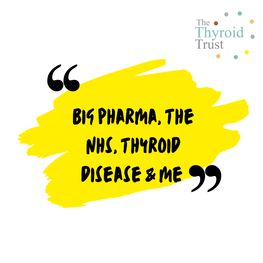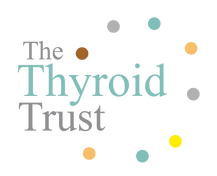 Article shared and written by Judy Copage Judy Copage, Co-editor -in -chief of Central Bylines. lives in Shrewsbury and spends her time walking on the Shropshire hills, discovering hillforts, attempting to learn photography, and occasionally writing and editing. She worked as a teacher of English as a foreign language and teacher trainer in Portugal, the United Arab Emirates, Malaysia and Greece for 20 years. Back in the UK, she was a Senior Lecturer in Linguistics at the University of Wolverhampton. She is Director of Copage Educational Services. This is a personal account telling the story of a battle with the NHS to get treatment for thyroid disease. Article originally published on Central Bylines at: https://centralbylines.co.uk/big-pharma-the-nhs-thyroid-disease-and-me/ For many years, after a diagnosis of autoimmune hypothyroidism (Hashimoto’s disease), I struggled with the medication I was given. I had no idea that what lay ahead of me was seven years of fighting for an alternative. Thyroid basic facts Your thyroid gland is in the neck. It straddles the trachea, just below the larynx. Until I became ill, I had no idea what it was and how it regulates the chemistry of the whole body. If it goes wrong, you can be affected in many different ways. It produces two hormones, thyroxine (T4) and triiodothyronine (T3). The balance of both is controlled by another hormone, TSH, which is sent from the pituitary gland to the thyroid. When the thyroid doesn’t work
An underactive thyroid doesn’t produce enough thyroid hormone so the pituitary sends more TSH to stimulate production. In my case, my immune system produced antibodies which destroyed my thyroid tissue. So no matter how high the level of TSH, my thyroid underperforms. I’d been feeling tired for years, but put it down to two very demanding jobs. I also experienced increased anxiety for the smallest thing. Then there was the weight gain and ‘brain fog’. I assumed that both were due to aging. My stomach was bloated and as time went on, I found I had no energy for anything. At one point, I was crawling up the stairs – walking was too hard. The diagnosis Finally in 2015, everything collapsed. I went to my GP who diagnosed hypothyroidism after a blood test to measure TSH. I was given the standard treatment, synthetic T4 (Levothyroxine) to be taken for life, and was told that the weight would drop off dramatically and I would feel better within a few months. Thyroid UK reports that, “Hypothyroidism is mostly seen in women between the ages of 40-50 and is seen in women ten times more often than men. It often occurs during the menopausal years and symptoms are often ignored by both patients and doctors if the patient is at this age”. This fitted my case. Later, I discovered that I had had a blood test years before with a high reading of TSH, which had been ignored. When T4 doesn’t work All seemed fine for a few months. I lost weight, felt better and had more energy. Then it all stopped. I found myself running out of energy suddenly, just as a car empty of petrol comes to a halt. I felt anxious all the time. I went back to the GP. Over several years, blood test followed blood test and the dose of T4 went up and down several times. Nothing seemed to work. I read everything I could find. On Health Unlocked I was astonished to find thousands of other people with the same problems. Converting T4 to T3 When T4 doesn’t work, there may be a problem with conversion. The body usually converts T4 into T3, the active thyroid hormone which penetrates every cell of the body. Theinvisiblehypothyroidism states: “A conversion problem of thyroid hormones is often not considered by doctors when patients don’t respond well to T4-only medication, but it is much more common than they realise.” The usual diagnostic blood test does not reveal this problem. Maybe I had a conversion problem – at last I was hopeful. I got an appointment with an endocrinologist but found only disappointment. “Your bloods are perfectly normal.” “But why do I feel so unwell?” “In that case, I have no idea what’s wrong with you.” I wondered why only the blood test was considered and the patient’s experience dismissed. I kept going. My research suggested that I needed Liothyronine, synthetic T3, a drug which is directly absorbed with no need for conversion. However, there is a problem. Liothyronine is very difficult to obtain, depending on where you live. Another battle loomed, this time with the postcode lottery of who can and can’t prescribe T3. In my area, T3 is blacklisted because of the medical opinion that it is ineffective. It is also extremely expensive. Some say that T3 doesn’t work Research on T3 shows conflicting and confusing results. The National Institute for Health and Care Excellence (NICE) advises that T3 should not be routinely offered “because there is not enough evidence that it offers benefits over levothyroxine monotherapy”. Considering the combination therapy of T4+T3, The Lancet comments: “With clinical trials not showing clear-cut superiority, combination thyroid hormone therapy remains controversial. However, acknowledging the limitations (small size, short duration, inconsistent dosage) of previous studies, specialist society guidance recognises that a trial of liothyronine might be appropriate in selected patients.” In my area, Shropshire, Telford and Wrekin policy follows the NICE position and cites the 2015 British Thyroid Association view that there is no convincing evidence to support the use of T3, and that its use is not “cost effective”. The price The cost of T3 involves Concordia, a Canadian pharmaceutical company. In 2017, the Competition and Markets Authority (CMA) provisionally found the company to have “abused its dominant position to overcharge the NHS by millions for an essential thyroid drug.” The British Medical Journal quotes some concerning statistics: In 2017, “the NHS spent £34mn … on liothyronine, compared with only £600,000 in 2006. The price increase of almost 6000% was imposed by Concordia … the monopoly supplier of the drug.” Concordia charges rose from £20 per packet in 2009 to £248 in 2017. The CMA found this to be excessive and unfair. In 2015, Concordia increased the pack price to £146 and Liothyronine (T3) was added to the NHS ‘drop list’ as poor value for money. The price went up further. clinical commissioning groups (CCGs) began to amend their guidance to GPs, limiting prescriptions of T3. Patients were left without an essential treatment and many resorted to buying it themselves. Greece was a popular choice, where today, T3 costs just €2.50 a pack. In 2018, Concordia changed its name to Advanz Pharma. In 2021, the CMA fined Advanz over £100mn for inflating the price of Liothyronine. In September 2022, Advanz started appealing after being fined three times in 14 months, calling the fine “manifestly wrong” and “quasi-criminal.” Guidelines misinterpreted The elevated cost of T3 has remained entrenched in the minds of CCGs. It is still blacklisted in many areas, even though Health Unlocked reports a drop in price from £268 per 28 tablets to £59. The Lancet makes the point that: “…substantial reduction in prescribing seems to have been largely driven by cost.” UK guidelines state that T3 should not routinely be prescribed. Those two words “not routinely” have been misinterpreted to mean ‘should not be prescribed’. Questions have been asked in the House of Lords by Lords Hunt and Borwick, partly with the intention of clarifying this wording. The conflicting positions described in the guidance only add to the confusion. On the one hand, it states: “The price of liothyronine has risen significantly and there is limited evidence for efficacy above Levothyroxine.” On the other hand, the need for T3 is guardedly recognised under section 5.13: “… where levothyroxine has failed […] endocrinologists providing NHS services may recommend liothyronine for individual patients after a carefully audited trial of at least three months duration.” Nevertheless, The Thyroid Trust finds that CCGs are still limiting prescriptions of T3. Lorraine Williams, director of the Thyroid Trust, said: “It’s simply unconscionable that effective treatment for this condition is being denied.” In 2021, NHS England wrote to the Thyroid Trust to confirm that they expect local health authorities to allow prescribing of liothyronine in line with the national guidance, and they expect CCGs to comply. To date, Shropshire, Telford and Wrekin CCG has not yet changed its blacklisting of T3. Finally, some progress My story continued. After an entirely unhelpful consultation with a local endocrinologist, I asked my GP for a second opinion. This changed my life. After a lengthy consultation taking in my medical history and my experience, I was put on a trial of T3 in addition to my T4. Within weeks, I felt well again. To say this was a sea change is an understatement. I had renewed energy, my digestion improved, the anxiety disappeared. I felt like a different person. A happy ending – but it shouldn’t have taken seven years, meeting barrier after barrier, to restore my health.
0 Comments
Your comment will be posted after it is approved.
Leave a Reply. |
Thyroid FriendsThis blog is by members of Thyroid Trust Friends Network who have signed up to our Ground Rules and blogging guidelines. Please get in touch if you'd like to write something for possible publication on our site. Archives
June 2024
Categories
All
|
for everyone affected by thyroid diseaseMeetingsWe organise regular information and support meetings online and in person.
Click here for upcoming dates. We are a small independent charity. We receive no government funding and are reliant on donations for our income. Please support us.
PlEASE CONSIDER SUPPORTING OUR VITAL WORKThe donate button above takes you to a secure donation processing platform, JustGiving. Please contact us if you would prefer to make a direct bank transfer to donate via any other means, or if you are interested in volunteering.
|
|
Proud members of the following organisations
|
Proud to be in a charity partnership with:
|
With thanks to all our supporters, including:
|
Correspondence ADDRESS15 Great College Street, London, SW1P 3RX
The Thyroid Trust is also known as TTT and Thyroid Friends Network,
Registered Charity Number 1183292 Registered Address: 15 GREAT COLLEGE STREET, LONDON, SW1P 3RX Copyright asserted 2019 - Our consititution and all policy documents can be viewed on request. Read our Privacy Policy updated 23/5/18, . |

 RSS Feed
RSS Feed








